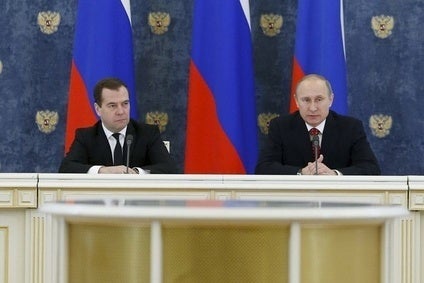
In a politically motivated move, Russian President Vladimir Putin signed a decree banning the import of certain agricultural products from countries that have imposed sanctions on it over the Ukraine crisis. A list issued today outlined the countries affected included Canada, Australia, the US, the EU and Norway. Foodstuffs banned include meat, poultry, dairy, fish, fruit and veg.
“For a long time, Russia has not responded to the so-called sanctions declared against it by certain countries. Until the last moment, we hoped that our foreign colleagues would realise that sanctions lead to a blind alley, and that no one benefits from them. But they didn’t realise this, and now we have been forced to respond” – Russian President Dmitry Medvedev justifies Moscow’s decision to issue the ban.

Discover B2B Marketing That Performs
Combine business intelligence and editorial excellence to reach engaged professionals across 36 leading media platforms.
“EU food and drink products make up almost half of the total Russian food and drink imports, which means that this ban will also have an impact on the Russian people” – FoodDrinkEurope, the trade body representing Europe’s food and drink industry, says the ban is likely to impact Russian consumers negatively.
“We underline that the European Union’s restrictive measures are directly linked with the illegal annexation of Crimea and destabilisation of Ukraine. The European Union remains committed to de-escalating the situation in Ukraine. All should join in this effort” – The Eruopean Commission makes it clear it is not budging on sanction impositions despite the import ban.
“The retaliatory measures that we are introducing will essentially open up shop shelves for domestic producers. Of course, Russian farmers will have to accomplish a lot and work hard, but this opportunity to launch and expand import-substituting production facilities should not be missed” – Medvedev wants Russian food producers to make the most of being able to supply locally on a bigger scale.
“Russia wouldn’t have a problem finding replacements – last month they signed a big deal on beef supply with Brazil and other Latin American countries. There is room for expansion of imports from other countries” – Constantin Gurgdiev, Chairman of the Irish Russian Business Association, believes Russia will survive without imports from Australia, Canada, the US and EU.

US Tariffs are shifting - will you react or anticipate?
Don’t let policy changes catch you off guard. Stay proactive with real-time data and expert analysis.
By GlobalData“The big worry in Ireland would be cheese. Last year we exported about EUR4.5m worth of cheese to Russia. That would be a real worry for us” – Simon Coveney, Irish Minister of Agriculture, raises concerns about the impact the import ban from Russia will have on Ireland’s cheese-making industry.
“It’s a very difficult situation for Valio and puts us in quite a difficult position. We are trying to manage the situation as best we can and we have some plans but can’t discuss those yet” – Finnish dairy company Valio says the ban will present challenges, but the firm is currently in discussion of how to offset the impact.
“The losses in export business with Russia must be balanced” – Christoph Minhoff, chief executive of the Federal Association of the German Food Industry, says the industry must explore other opportunities and develop new markets for trade.
“The biggest impact, we believe, will be on Russian citizens who will be burdened by higher prices for all food products, especially meat and poultry. The price of poultry in Russia is already rising and has recently been increasing at a rate of 2% to 3% per week” – US poultry industry body the National Chicken Council says the ban is unlikely to have a big impact on US poultry imports.



